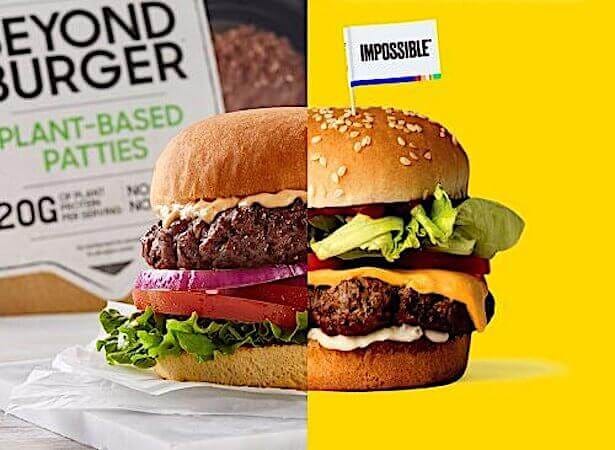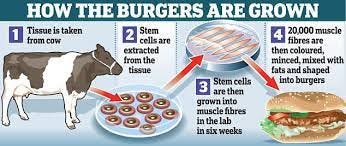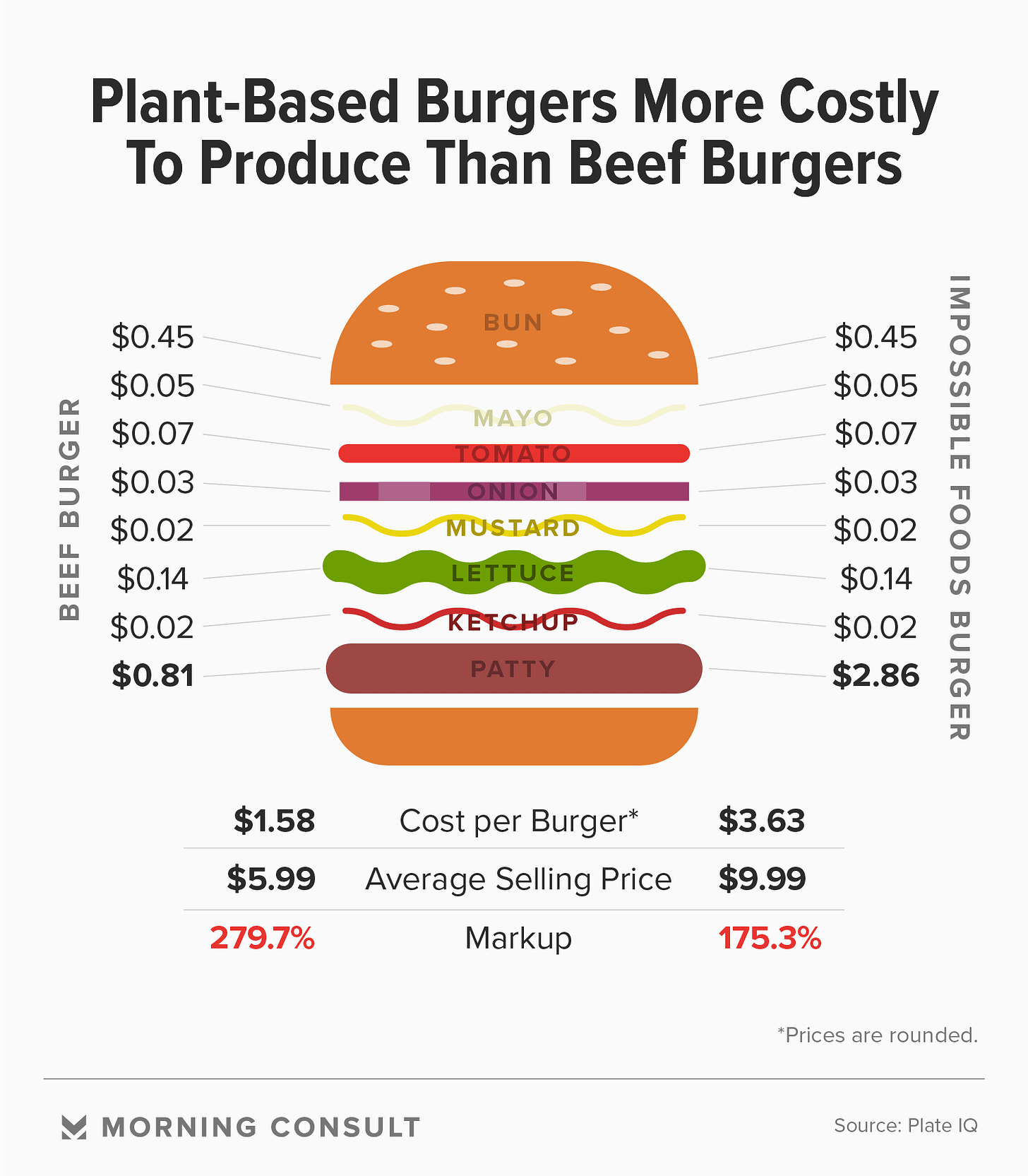The Health Ambush of Fake Meats

Have you been told that plant foods are healthier for you? That they’re lower in saturated fats? That they’ll lower your blood pressure? Don’t believe the hype! These fake bacon, sausages, chicken nuggets, eggs or burgers might be worse for your health than the meat versions they’re replacing.
Corporations make plants taste and have mouth feel resembling real beef, but it’s done through chemical additives. After all, veggie burgers don’t grow in the ground. They’re made in factories.
I included this article on the free side of SrongHealth because I believe that everyone needs to read it, and I’ll be honest with you; I’ve been watching this industry for a good number of years and it has crept up from a corner nook of the food industry into mainstream acceptance. Due to incessant marketing, people have begun changing their perspective as vegan products have become more accessible and thousands of new menu options drop every year.
It’s a huge coup for the multi-billion dollar plant based food industry which openly advocates for putting the animal agriculture industry out of business.
Let’s have a look at some of the facts:
For decades, we’ve heard the narrative that meat is bad for your personal health and bad for the environment. Obviously, these messages haven’t gone far because most people aren’t vegans or vegetarians. What’s changed increasingly is the claim that plant based food formulations mimic actual meat. This causes consumers to be curious about the product, a fact driving purchases.
TotalFood.com says their data shows that 90 percent of consumers who are trying “beyond burgers” are not vegetarians. Many look for a healthier alternative on their plate while still indulging in other things like fries. It’s just mental justification.
The biggest misconception is that these foods are healthier. But the truth is that they’re processed and full of chemicals and additives that you and I can’t pronounce, while lacking in critical nutrients. This is a fact never pointed out by industry.
Something plant-based protein peddlers would love to have you avoid is an analytical look at their ingredient labels, which read more list of materials you’d find in a hi-tech chemistry lab. Because that’s what it is: a factory produced, ultra-processed food (UPF) product with added synthetic and genetically modified ingredients that you wouldn’t typically find in your kitchen cupboards — emulsifiers, stabilizers, humectants, preservatives, bulking agents, flavorings, and other additives.
Impossible Foods derives heme, the molecule that gives beef its “meaty” flavor, from a protein found in soy called leghemoglobin. This heme is mass produced from this soy protein with the assistance of GE yeast.
Other commonly used food ingredients contribute to the beef-like texture and flavor as well. Apart from water and vegetable oils, it contains soy protein concentrate, ‘natural’ flavors, potato protein, methylcellulose, yeast extract, cultured dextrose, food starch modified, genetically engineered soy leghemoglobin, mixed tocopherols, soy protein isolate, zinc gluconate, thiamine hydrochloride (Vitamin B1), niacin, pyridoxine hydrochloride (Vitamin B6), riboflavin (Vitamin B2) and Vitamin B12.
The soy leghemoglobin or ‘heme’ is arguably the most controversial ingredient: a unique red colored flavoring added to make the burger appear to ‘bleed.’ But unlike the natural heme found in real beef, this heme is mass-fermented in laboratory conditions by adding soy protein to a genetically engineered yeast. (agreenworld.org) Studies have shown that GM soy can cause organ damage in animals and is significantly different from non-GMO soy.

Beyond Meat products are also unhealthy. Their CEO says in interviews that they “just take the amino acids and the fats from another source and recreate those.” But in truth, Beyond Meat products also include things like dipotassium phosphate, potassium chloride, titanium dioxide, maltodextrin, red 40, yellow 6, guar gum, locust bean gum, gum arabic, TBHQ, etc.
Check out the label on their flagship product, the original Beyond Meat burger:
Studies proving ingredient harm:
2021 study in journal Microbiome: Emulsifiers will damage the gut microbiome and cause bodily inflammation, with some impacts being non-reversible. This includes carrageenan, xanthum gum, guar gum, locust bean gum, polysorbate 80, maltodextrin, gum arabic, carboxymethellcellulose, and propylene glycol alganate.
March 2022 Journal of Pediatric Gastroenterology and Nutrition - emulsifiers may harm the intestine inflammation.
January 2022 journal Microorganisms - Artificial emulsifiers and sweeteners may induce alteration of the intestinal barrier, cause chronic inflammation, and abnormal immune response accelerating the onset of IBD."
October 2021 journal Nutrients - Synthetic dietary emulsifiers, including carboxymethylcellulose (CMC) and polysorbate-80 (P80), promote aggressive intestinal inflammation without changing bacterial composition.
Source: Vegblogger.com
Coming soon to your dinner plate - lab grown meat.
The world’s first cultured beef burger was produced by Professor Mark Post at Maastricht University in The Netherlands. It was cooked and eaten publicly at a London restaurant in 2013. It took three months to grow the meat and cost €250,000.
Now more than 60 companies in six countries are working to produce cultivated – or cell-cultured – meat in the form of chicken, beef, pork, seafood, pet food, and beyond, according to the Good Food Institute. These companies are backed by huge investments from meat industry corporations (Cargill and Tyson), venture capitalist firms (Blue Yard Capital, Union Square Ventures, S2G Ventures, and Emerald Technology Ventures), and billionaires (such as Bill Gates and Richard Branson). (Source: centerforfoodsafety.org)
There are three primary steps required to make a burger in the lab. Scientists identify “starter cells” that can be turned into muscle, supply them with nutrients then grow them in a controlled laboratory environment. The cells that are used in the production of lab-grown meat are called stem cells—these are cells that can self-renew and differentiate into more specialized types of cells.

The nutritional value of lab-grown meat certainly remains an open question because it is still not fully understood, specifically in comparison to animal-derived meat.
Another major issue associated with processing methods using cell lines and/or culture medium is contamination. Unlike animals, cells do not have a fully functioning immune system, so there is a high likelihood of bacterial or fungal growth, mycoplasma, and other human pathogens growing in vats of cells.
The Center for Food Safety says another concern is the genetic engineering of cells and their potential cancer-promoting properties. We need more information on how the cells are engineered and kept growing. Many of the companies are claiming this information is confidential and fail to provide full disclosure. Even following FDA cell culture guideline is folly because their guidelines are not designed for food.
Read on the rest of the process here.
We Are Being Lied To
So when fake/lab produced meat companies or their marketing surrogates tell you that their alternative to real meat are natural and healthy for you—you may want to think twice. The rise of plant-based/lab grown meat alternatives is just the latest attempt to mislead consumers into thinking they are making better health and environmentally conscious choices. In reality, global agribusinesses have discovered that plant-based product lines can generate vast profit margins through the ultra-processing of cheap commodity crop materials, such as protein extracts, starch and oil.
And guess what? It’s going to cost you more to make that “green choice.” Nielsen data demonstrates that, on average, plant-based meat is 2x as expensive as beef, more than 4x as expensive as chicken, and more than 3x as expensive as pork per pound.
Source: Nielsen Perishables Group
It's all about being informed. If you want to include these products in your diet that's your choice, but at least understand the risks.
Real Animal Food Benefits
Dr. Paul Saladino, author of "The Carnivore Code," says animal foods are uniquely healthy for humans, especially with optimum vitamin B12 levels and what he calls "the three C's," which are entirely or close to entirely lacking in plant foods:
•Creatine — found only in animal food, is part of the phosphagen system in your muscles and part of your body's energy metabolism. Creatine helps with improvements in working memory, intelligence, and decision-making tasks.
•Choline — important for the membranes of every cell in your body. It's also been shown to protect against nonalcoholic fatty liver disease.
•Carnosine — important because of the way it positively correlates to slowing down aging and chronic disease in humans. Carnosine is not present in plant foods, predisposing one to heart disease, cancer and Alzheimer's.
Vitamin A - animal foods are also a good source of retinol vitamin A, with egg yolks and liver being very rich sources. It’s better absorbed than beta carotene from plants, which must be converted into retinol. Many lack the enzyme required for this conversion, which means they cannot break down the beta carotene to make the active form of vitamin A.
Vitamin K - primarily found in plants while K2 — which seems to provide most of the benefits — is found in animal foods and fermented foods. Research shows a clear correlation between higher K2 levels and lower incidence of cardiovascular disease. No such correlation exists for vitamin K1. Unfortunately, most nutrition calculators look only at K1, which is why many are under the mistaken belief that there is no vitamin K in animal foods.
Vitamins E + C - neither is properly measured in animal foods, thus leading to the mistaken belief that you need plant foods for these nutrients. But meat and animal foods contain sufficient amounts of both.
Source: Mercola.com
None of this information is meant to offend. If you believe you should avoid animal foods for ethical, cultural or religious reasons, that's certainly your choice. But stating that it’s healthier than a diet including meat is based on a lie perpetuated by epidemiological (observational) studies that cannot determine causation. I could find a study stating there’s a correlation between eating cheese and getting tangled up in bed sheets, but this simply ties two things together without causal relationship.(spuriouscorrelations.com)
Nutritional science is a mess because at its best, a hypothesis should be tested with long enough studies. But how do you do a study long enough where you're simply giving some people more vegetables and excluding other lifestyle factors?
Displacing beef is a major goal for plant-based meat industry. But why would anyone think eating a “beyond meat burger” created in a lab, with a lot of toxic ingredients – is healthy? Support your local farmer by buying grass-fed meat. There is a sustainable relationship between land and animals, and this process literally builds topsoil, which is necessary for a healthy environment.
You know what’s not sustainable? Soy and canola, two of America’s largest scale mono-crops, grown on thousands of acres of land doused with pesticides. There are no animals to sustain this land, so you lose in nutrient diversity.
It’s more important to show an interest in optimal health than in dogmatic adherence to a mainstream narrative. There is a clear history of mankind eating a diet that includes animals. The evidence also points to the clear fact that people were much healthier in times past than today, clearly suggesting our modern disease states are in large part, a commercial entity based on “fake” foods. Think about it!






